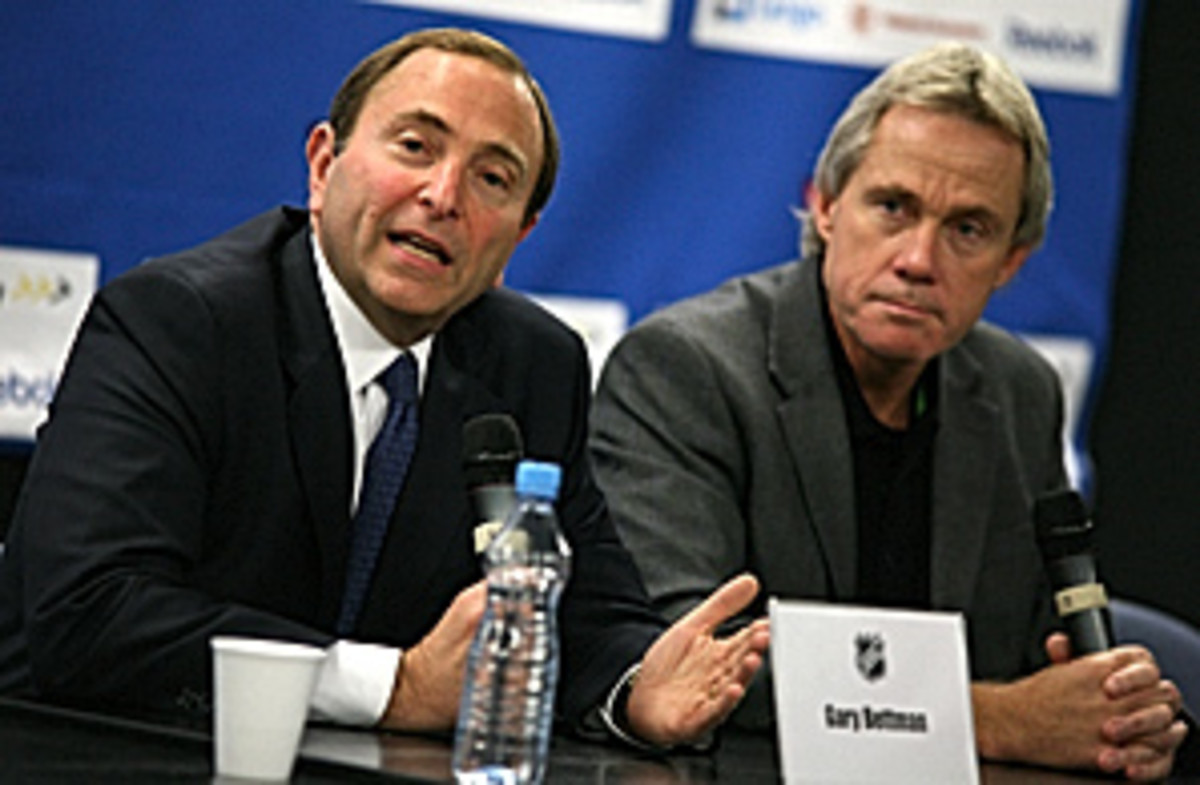
CBA coming back to bite unhappy players in the wallet
"There is no partnership," they claimed, "because no matter what happens, the owners are playing with the players' money. The escrow clause sees to that."
Few people listened. After the post-lockout return for 2005-06 in which the NHL won back fans and exceeded what may well have been underestimated revenue, little thought was given to the money that was taken out of the players' paychecks and held in escrow just in case the costs of their contracts exceeded their portion of the overall pot.
It's a different story now. The cynics have a case and according to a report inSports Business Journal, the players are going to take a Steve Downie-force hit to their wallets. It can make for an ugly time in the PA's ranks as well as the players' relationship with their bosses when bargaining for the next CBA gets underway.
Citing sources with knowledge of the league's financial projection for the current regular season, SBJ claims the NHL is poised to take some $120 million in cash from the escrow fund that was set up to insure that salary costs don't exceed the projected $58.7 million per-team cap. As a result, owners will get a cash payout of $4 million per club. That's a somewhat significant amount in a league that still gets the bulk of its revenue from ticket sales. It's also a development that won't sit well with the players who, in two of the last three seasons, got all of their money back plus a few extra bucks (because revenue exceeded deductions). In the one season they did not (2006-07), the withheld funds amounted to just over two percent.
The players were warned before the CBA was signed that this could happen, but few paid attention until a recent bump-up pushed the withholding total to 22.5 percent. An announcement of 25 percent, and the NHLPA's decision to decline its option to reopen the CBA this year (it expires in 2011), came around the All-Star Game in Montreal and didn't cause much stir in the ranks or media. Now players are starting to get a better sense of how much they might have to surrender this season. It is not an appealing prospect, especially at the highest levels of the PA.
"This CBA system was reached through a year-long owner's lockout," said Paul Kelly, who replaced the ousted Saskin in October 2007. "The current escrow rate has certainly reminded the membership of the importance of making improvements to the CBA in future negotiations with the league."
If you've read this far -- thanks for staying with a topic as dry as David Letterman's wit -- you're probably asking, "Why the heck should I care?
How about: because the players appear to be signaling that they are ready for a fight.
In these difficult economic times, the flaws of the CBA's system have been highlighted. Kelly, who came to the PA well after the agreement that ended the longest dispute in pro sports history, has indicated that the players are unhappy not only with having to pay money they thought would be contractually theirs, but because, in their estimation, the NHL hasn't done much to fix franchises that are draining its overall profitability.
The current focal point is the fiscally strapped Phoenix Coyotes, but several franchises are said to be in serious difficulty. The lack of a comprehensive plan to stanch the red ink grates on the players, especially since they are suffering economic reversals of heretofore incomprehensible proportions.
Tears are seldom shed for well-heeled owners even though they take the bulk of the risk with capital. But even with stringent economic oversight in place, many players still believe the owners don't identify all of their hockey-related income. It's a largely unfair accusation given the resources the players have to audit such things, but they also feel the owners move slowly to fix economic issues (like relocating failing franchises) because the CBA provides an economic buffer largely at the players' expense.
That's difficult to prove, but in the world of perception it can prove to be reality simply because one side or the other believes it to be true. Indeed, the SBJ article bylined by Tripp Mickle points out that even with the league's overall revenue for this season a moving target until the final accounting is done, the total amount is projected -- according to insiders -- somewhere near $2.64 billion. The CBA allows $1.495 billion for player salaries, but those are thought to be closer to $1.559 billion and that doesn't include bonuses, award payments, or other costs that could add upward of $100 million to the final total. If that holds true, the difference will go to the NHL in a complicated distribution plan for member clubs, but all the cash comes out of the players' escrow fund.
It is expected that the players will have 18 percent of their salaries withheld and that could put some $280 million into the hands of the owners, the bulk of which, estimated at significantly more than the already projected $120 million, will be used by the league to cover cost overruns. It's a galling amount for the players and it's likely to lead to demands for franchise relocation, something the league has been loath to move on. It also sets the stage for contentious position-taking en route to the next negotiating period for a new CBA.
As partnerships go, this one may start to get ugly soon.




